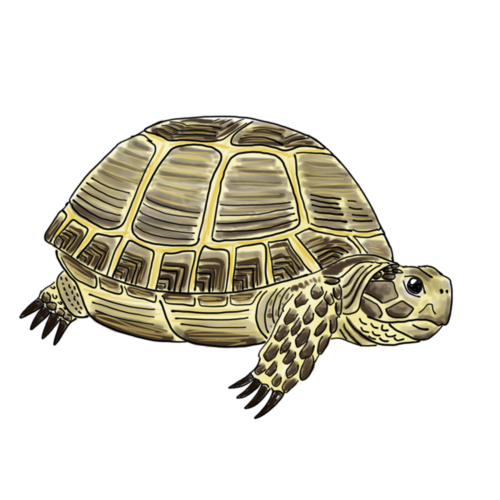Russian Tortoise (aka Horsfield’s Tortoise) - Agrionemys horsfieldii
Please note: These are general recommendations; they are not meant to be construed as veterinary advice, and may not be appropriate for your pet. Be sure to schedule a visit with your local veterinarian to discuss the best care for your animal!
Russian Tortoises are sturdy, popular tortoises which make great pets for owners looking for a long-lived animal (they can live 40 to 50 years!). They are a relatively ‘small’ tortoise, reaching maximum shell lengths around 8 to 10 inches.
Diet:
Feeding Russian Tortoises can be tricky. It’s important to get them a wide variety of foods, predominantly grass hays (such as Timothy hay) and dark leafy greens (such as romaine or red leaf lettuce). Pelleted hay may be more appetizing to some tortoises (they can be picky!), or you can try soaking hay to make it more appealing. Be sure not to leave un-eaten damp hay in the cage or it will rot! Variety is key though, so make sure you talk to your veterinarian about good veggie options! Russian Tortoises usually need calcium supplementation along with their diet, as well as periodic vitamin supplementation. Talk to your veterinarian about how to make sure your tortoise is getting the right amount of supplements!
Russian Tortoises can have a water dish for drinking, but they tend to make a mess, either tipping the dish over or defecating in the dish! Ick! Soaking your tortoise in lukewarm water a few times a week can replace the need for a water dish, and also helps encourage defecation. If you do keep a dish in the cage, be sure to clean it very frequently and remove any substrate that becomes damp from a spilled dish!
Housing:
Russian Tortoises naturally need a lot of sunlight, so indoors they require ultraviolet (UVB) lighting to act as the sun! These lights usually need to be replaced every 6 months or so, because the UVB output will decrease even if the light still looks like it is functioning normally. The placement of the light is important as well; wire screens can reduce how much light reaches your tortoise, and glass can block UVB light entirely! Generally lights should be kept between 12-18 inches above the cage floor.
Like many reptiles, Russian Tortoises can get Metabolic Bone Disease (also called nutritional secondary hyperparathyroidism, which is much too long to say) if they don’t get the right amount of calcium and phosphorous in their diets, or if their UV lighting isn’t working. Be sure to talk to your vet about proper diets, vitamins, and cage set-up!
Russian Tortoises are reptiles, so they are ‘cold blooded,’ which means they rely on the temperature of their environment to regulate their body temperature. Russian Tortoises need a basking spot in the cage where they can relax and enjoy the heat (up to 90F degrees during the day!) but they also need a cooler area of the cage (around 70F degrees) for when they are done basking. By moving between warmer and cooler areas, Russian Tortoises can make sure they keep their internal heat just right. At night they can tolerate cooler temperatures in the upper 60s. In nature, the sun provides both heat and UV light, so it’s important that the UV light be located near the heat source so that your animal can chose to increase or decrease their heat and UV exposure together.
Russian Tortoises love to hide and burrow. Hide boxes should be available, ideally one in a warm part of the cage and another in a cooler spot.
In the wild Russian Tortoises may hibernate during the winter, but this is not recommended for pets.
Zoonotic Diseases:
Be sure you wash your hands well after playing with your tortoise to make sure you don’t get germs! Salmonella is particularly of concern for reptiles. Salmonella can live on and around your reptile without actually affecting your animal, but still is a risk to people. We cannot completely get rid of the salmonella in most cases, so it’s very important to always make sure you wash your hands after handling a reptile, and do not allow a reptile to roam freely in the house!
Dr. Chuck recommends Russian Tortoises go to the veterinarian at least once per year to make sure they are healthy and happy!
